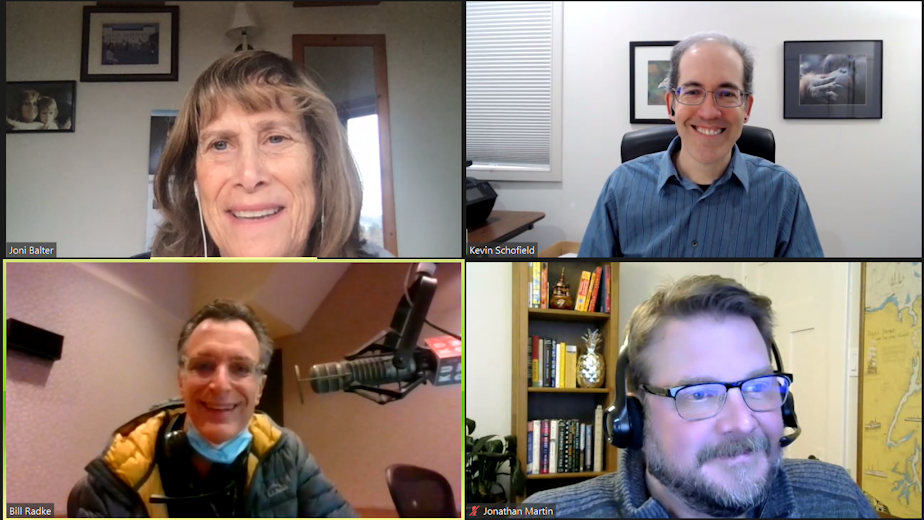The Sawant recall election, encampment removals, and omicron, this week.

Bill Radke reviews the week's news with Political analyst and contributing columnist Joni Balter, SCC Insight's Kevin Schofield, and Seattle Times Senior Investigative Reporter Jonathan Martin.
Kshama Sawant has yet again made up the wide gulf of votes between Election Night and the days following, when more progressive votes tend to be counted. The difference a hair above half a percent, with the Sawant holding a narrow lead. We know that votes counted later tend to be more left-leaning, i.e. favoring Kshama Sawant. But there aren't many votes to be counted, if King County Elections predictions of 50% voter turnout are correct. The three charges against her are that she used City resources to support a ballot initiative and failed to comply with the public disclosure requirements related to such support, disregarded state orders related to COVID-19 by admitting hundreds of people into City Hall on June 9, 2020 when it was closed to the public, and Led a protest march to Mayor Jenny Durkan's private residence, the location of which Councilmember Sawant knew was protected under state confidentiality laws. If Sawant prevails, she will still be facing the fact that roughly half of her district wants her gone. What does this recall election say about the mindset of voters in Seattle right now?
Three cases of omicron have been detected in Washington state so far — one in King County, one in Pierce County, and one in Thurston County. The King County case is a woman in her 20s who tested positive for omicron on November 29. She was fully vaccinated. While she did receive a booster shot, she likely received it after being exposed to the virus. The woman has experienced a mild illness. Public Health - Seattle & King County reported Wednesday that the patient who tested positive for the omicron variant did not recently travel. This would indicate that the variant has been spreading among the community. Knowing that omicron is now local (and likely has been for a while), will this change our behavior? Returning to the office is becoming something more and more businesses are gearing up for. Amazon is set to return on January 3rd, while many other businesses are also planning a return in the first quarter of 2022. For those who were working remotely, what sort of image do they have in their head about returning to the office after 21 months, and what is and isn’t likely a reality of what they envision
This week two Seattle homeless encampments were cleared by the city. Ballard Commons, which was cleared Tuesday by Seattle Parks and Recreation, was also cleared in 2019 and 2020, and each time homeless campers have returned. The Bitter Lake encampment, which is situated in between a playfield and a school playground, has been around for more than a year. Prior to this week’s clearing outreach workers spent months trying to move residents inside. The Ballard encampment had just 11 people left living there when it was cleared today - 42 had already left to new tiny house villages, 18 to shelters, and six to housing. At Bitter Lake, six people remained after 36 referrals since September. Ballard Commons is now blocked off to the public while maintenance crews repair damage and address “backlogged maintenance”. Is this new strategy by the city, doing months of referrals prior to sweeps, working?
With thousands of people living in cars right now in Seattle, some businesses have taken to putting concrete blocks in the parking area in front of their business to block homeless people from parking there for long periods of time. That is against the law, but so is parking for more than 72 hours, and neither law is currently being enforced. As you might imagine, advocates on both sides want to see the law that best suits their interests enforced. And while the city is talking about a “safe lot” program for RV’s, it’s unlikely that any such program would be able to accommodate the volume of vehicles. Does one side have a stronger case than the other?
This week Starbucks workers in Buffalo, New York voted in favor of unionization. The National Labor Relations Board said that workers voted 19-8 in favor of a union at the Elmwood Avenue location, one of three stores in Buffalo where elections were being held. A second store rejected the union in a vote of 12-8, and the results of a third store could not be determined because both sides challenged seven separate votes. Starbucks and Workers United, the union vying to represent the workers, now have 5 days to object to the election results. What does this mean for Starbucks’ future?







